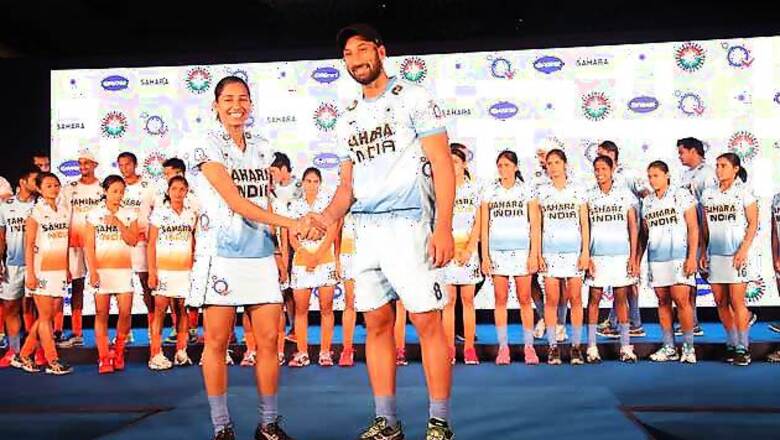
views
Competitive training in Europe, anti-corruption education, experience of playing without seniors and fitness to match the best - Indian men's hockey team couldn't have asked for better all-round preparation to launch their quest to qualify for the 2014 FIH World Cup.
The key to unlock the World Cup door lies with the FIH Hockey World League (HWL), where six top finishers from the two eight-team semi-finals will gain entry to the coveted event (qualification process).
Rotterdam is the venue for the first semi-final event, where the Indian men's and women's teams will slog it out to win the tournament; and if not that, then at least finish among the top three to book a ticket to the World Cup.
The men's and women's competition will be held simultaneously at Rotterdam, while the second semi-final event will be held in Malaysia (men) and London (women). The eight teams involved in each of those two events will be divided into two pools of four each. The ideal scenario would have been the top two teams from both the pools making it to the last four. But all eight will progress to play the quarter-finals, which makes the pool fixtures 'practice for the knockouts'.
Two finalists and winners of the third-fourth place play-off qualify for the World Cup.
The preparation
The 12th ranked Indian men's team has had a busy six-month build-up to the event. It began with the Sultan Azlan Shah Cup, where a 5th-place finish was a learning experience for the team without seniors Sardar Singh, VR Raghunath and SV Sunil who were rested for the event. The high point of that campaign was two wins against archrivals Pakistan - a consolation after close defeats to Australia, Korea and New Zealand.
The home-and-away series against Pakistan was called off on political grounds, but Hockey India League (HIL) made up for it by bringing young Indian talent like Mandeep Singh to the forefront.
India's hunt for a World Cup berth began with HWL Round 2 at home. The team had a job on its hand with only the winner of the event guaranteed a place in the Rotterdam semi-finals. The opposition wasn't great and home support a huge plus for the Indians, who beat Ireland, Bangladesh, China, Oman and Fiji in a row to progress unbeaten.
Probables for the HWL semis, which included Sandeep Singh and Shivendra Singh - recalled for the national camp for the first time after the Olympics debacle last year, gathered in Bangalore next. That followed an acclimitization-cum-prepartory tour of Europe and Sandeep Singh got on the flight, but not Shivendra.
Goalkeeper Sreejesh missed the tour due to his marriage but it didn't stop the team from beating the Dutch national team twice. India also played five matches against top Dutch clubs on that tour.
Sandeep's hopes had been re-ignited for a return to the national team, while Shivendra waited anxiously for the announcement of final 18. In the end, the selectors tick-marked both to play in Rotterdam. News worth its wait for an opportunistic striker and a lethal drag-flicker.
The expectations
For the men, it will be a goal achieved; for women, a bonus. That's how the two teams from India are being looked at.
Skipper Sardar remains the linchpin of this hungry Indian outfit. He is arguably the best central midfielder in the world at present, despite losing the 2012 FIH Player of the Year award to Germany's Moritz Fuerste. The charismatic playmaker can lift the whole team on his day and is leading a team brimming with talent, which is summed up in two sentences by Hockey India's High Performance Director, Roelant Oltmans.
"Akashdeep Singh and Mandeep Singh are two promising forwards in the frontline [and] Shivendra coming back augurs well for India; he will lend experience to the young strikers," Oltmans said. We also have three of the best penalty corner specialists in the world in Sandeep, VR Raghunath and Rupinderpal Singh."
But team coach Michael Nobbs understandably sounded cautious, with his team in the tougher pool along with hosts Netherlands, New Zealand and Ireland. "It's a very tough competition. All the teams want to go through. We are equally keen and will give it our best shot. We are good in attack but need to work on our defence."
Sardar too warned his boys against losing possession and the letting the opponents in. "We go there with a very good chance but it depends on how tough we play, how we concentrate. We should be particularly careful about not giving away easy balls to our opponents."
The 11th-ranked Indians, winners of the 1975 World Cup, are expected to win the opening match against Ireland (ranked 15th) on June 13 but will be tested by Netherlands (3rd) and New Zealand (6th). Australia (2nd), Belgium (9th), France (17th) and Spain (7th) are in Pool A.
The real tournament, however, begins in the knockouts thanks to the format ensuring all eight teams progress to the quarter-finals irrespective of the results in pool games.
Women's Competition
India (12th) and Japan (9th) were the two teams from HWL Round 2 to progress to the semi-finals.
At Rotterdam, the Indian women will be up against it and their coach Neil Hawgood said exactly that in no uncertain terms, calling World Cup qualification a bonus. "We'll be playing teams ranked No. 1, 3, 5, 7. So it's going to be really tough. I don't expect anything out of the ordinary. Qualification will be a bonus. I am particularly keen to see if the little things we have worked on have changed or not."
Ritu Rani will be leading the Indian team that is clubbed with Belgium (13th), Germany (5th) and New Zealand (3rd) in Pool B. China (7th), Japan (9th), Korea (8th) and Netherlands (1st) make up Pool A.




















Comments
0 comment